Today is the Day of Military Glory of Russia - the Day of the Taking of the Fortress Izmail
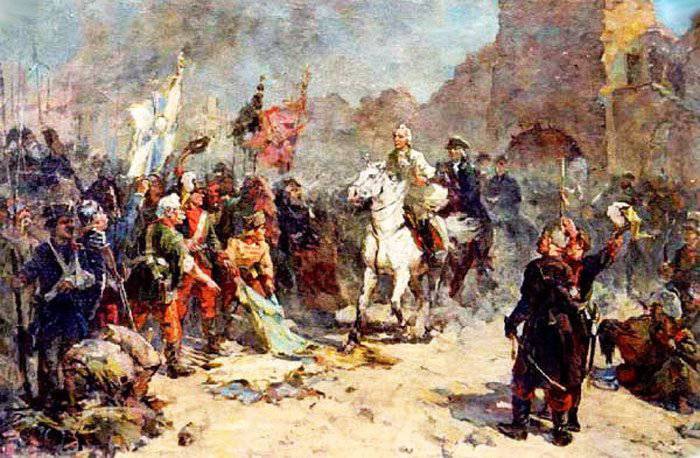
The Day of Military Glory of Russia, celebrated today, is established in honor of the Day of the capture of the Turkish fortress by Ismail Russian troops commanded by A. Suvorov in 1790 year. The holiday is established by the Federal Law No. 32-FZ of March 13 1995 of the Year “On the days of military glory (victorious days) of Russia”.
Of particular importance in the Russian-Turkish war of 1787 — 1791 was the capture of Ishmael - the citadel of Turkish rule on the Danube. The fortress was built under the leadership of German and French engineers in accordance with the latest requirements of the fortification. From the south it was defended by the Danube, which is half a kilometer wide here. A moat with a width of 12 meters and a depth of 6 to 10 meters was dug around the walls of the fortress, in some places of the moat there was a water depth of up to 2 meters. Inside the city there were many stone buildings, convenient for defense. The garrison of the fortress numbered 35 thousands of people and 265 guns.
Quick reference
The assault on Ishmael in 1790 was undertaken during the Russian-Turkish war of 1787-1792. by order of the commander-in-chief of the Southern Army, General Field Marshal G. A. Potemkin. Neither N.V. Repnin (1789), nor I.V. Gudovich and P.S. Potemkin (1790) could solve this problem, after which G.A. Potemkin entrusted the operation to A.V. Suvorov. Arriving on December 2 under Ishmael, Suvorov spent six days preparing for the assault, including teaching the troops to assault the models of the high fortress walls of Ishmael. The commandant of Ishmael was asked to capitulate, but he responded by telling that "the sky would fall to the ground rather than Ishmael would be taken."
Within two days, Suvorov was conducting artillery training, and on December 11 in 5 h 30 mines the storming of the fortress began. By 8 am, all the fortifications were occupied, but resistance on the city streets continued until 16 hours. Turkish losses amounted to 26 thousand people. killed and 9 thousand prisoners. The loss of the Russian army amounted to 4 thousand. killed and 6 thousand wounded. All guns, 400 banners, huge reserves of supplies and jewelry for 10 million piastres were captured. The commandant of the fortress was appointed M.I. Kutuzov.
Today, Ishmael with a population of 92 thousands of people is a city of regional subordination in the Odessa region
prehistory
Not wanting to come to terms with the results of the Russian-Turkish war of 1768 — 1774, Turkey in July 1787 of the year ultimately demanded that Russia return the Crimea, renounce the patronage of Georgia and agree to inspect the Russian merchant ships passing through the straits. Not having received a satisfactory answer, the Turkish government 12 August 1787 of the year declared war on Russia. In turn, Russia decided to take advantage of the situation in order to expand its possessions in the Northern Black Sea region due to the complete ousting of the Turkish invaders from there.
In October, 1787, the Russian troops commanded by A.V. Suvorov almost completely destroyed the 6-thousandth troops of the Turks, who intended to seize the mouth of the Dnieper, on the Kinburg spit. Despite the brilliant victories of the Russian army near Ochakov (1788), in Fokshan (1789) and on the River Rymnik (1789), the enemy did not agree to accept the terms of the world, which Russia insisted on, and in every way delayed the negotiations. Russian military leaders and diplomats were aware that the successful completion of the peace negotiations with Turkey would be greatly facilitated by the capture of Ishmael.
Izmail fortress lay on the left bank of the Kiliya arm of the Danube between lakes Yalpukh and Katlabuh, on the slope of a sloping height, ending at the Danube bed with a low but rather steep slope. The strategic importance of Ishmael was very great: the paths from Galati, Khotin, Bender and Keely converged here; here was the most convenient place to invade from the north beyond the Danube into Dobruja. By the beginning of the Russian-Turkish war of 1787-1792, the Turks, under the leadership of German and French engineers, turned Ishmael into a powerful fortress with a high shaft and a wide moat depth from 3 to 5 fathoms (6,4-10,7 m), sometimes filled with water. On 11 bastions, 260 guns were located. Ishmael’s garrison comprised 35 of thousands of men under the command of Aydozle-Mehmet Pasha. Part of the garrison was commanded by Kaplan-gire, the brother of the Crimean Khan, who was assisted by his five sons. The Sultan was very angry with his troops for all the previous surrenders and ordered the firman to execute everyone in his garrison in the event of the fall of Ishmael, no matter where he was found.
Siege and assault of Ishmael
In 1790, after the capture of the fortresses of Kiliya, Tulcha and Isakcha, the commander in chief of the Russian army, Prince G.A. Potemkin-Tauride ordered the detachments of generals I.V. Gudovich, P.S. Potemkina and flotilla General de Ribas take possession of Ishmael. However, their actions were indecisive. On November 26, the military council decided to lift the siege of the fortress due to the approaching winter. The Commander-in-Chief did not approve this decision and ordered General Anshef A.V. Suvorov, whose troops stood at Galati, take command of the units besieging Ishmael. Having taken command on December 2, Suvorov returned to Ishmael the troops departing from the fortress and blocked it from land and from the Danube River. After completing the preparations for the assault in 6 days, Suvorov sent an ultimatum to the commandant of Izmail on December 7, 1790, demanding that the fortress be surrendered no later than 24 hours after the ultimatum was delivered. The ultimatum was rejected. On December 9, the military council assembled by Suvorov decided to immediately begin the assault, which was scheduled for December 11. The attacking troops were divided into 3 detachments (wings) of 3 columns each. The detachment of Major General de Ribas (9 thousand people) attacked from the river side; right wing under the command of lieutenant general P.S. Potemkin (7 people) was supposed to strike from the western part of the fortress; left wing of lieutenant general A.N. Samoilova (500 thousand people) - from the east. The cavalry reserves of the Westfalen foreman (12 men) were on the land side. In total, the army of Suvorov totaled 2500 thousand people, including 31 thousand - irregular, poorly armed. (Orlov N. Sturm Ishmael Suvorov in 15, St. Petersburg, 1790. P. 1890.) Suvorov decided to start the assault at 52 a.m., about 5 hours before dawn. Darkness was needed for the suddenness of the first blow and mastery of the shaft; then to fight in the dark was unprofitable, because the command of the troops was difficult. Anticipating stubborn resistance, Suvorov wanted to have at his disposal as much daylight hours as possible.
On December 10, as the sun rose, preparations began for an assault with flank batteries, from the island and from the flotilla ships (about 600 guns in total). It lasted almost a day and ended 2,5 hours before the start of the assault. On this day, the Russians lost the killed 3 officers and 155 lower ranks, the wounded 6 officers and 224 lower ranks. The assault did not come as a surprise to the Turks. Every night they were ready to attack the Russians; in addition, several defectors revealed to them Suvorov’s plan.
At 3 in the morning of December 11, 1790 of the year launched the first signal flare, along which the troops left the camp and, rebuilding themselves in columns, advanced to designated locations. At half past five in the morning the columns moved to attack. Before others approached the fortress 2-I column of Major General B.P. Lassi At 6 in the morning hours, lassie huntsman overcame a rampart under a hail of enemy bullets, and a fierce battle ensued at the top. Absheron shooters and the Fanagori grenadiers of the 1-th column of Major-General S.L. Lvov overturned the enemy and, having captured the first batteries and the Khotyn gates, connected to the 2 column. The Khotyn gates were open for cavalry. At the same time, on the opposite end of the fortress, the 6-I column of Major-General M.I. Golenishcheva-Kutuzov captured the bastion at the Kiliya Gates and occupied the rampant up to the neighboring bastions. The greatest difficulties were given to the 3 column of the Meknob. She stormed the great northern bastion, adjacent to it to the east, and the curtain wall between them. In this place, the depth of the moat and the height of the shaft were so great that the stairs in 5,5 fathoms (about 11,7) were short, and I had to tie them two together under fire. The main bastion was taken. The fourth and fifth columns (respectively, Colonel VP Orlov and Brigadier MI Platov) also completed the tasks assigned to them, defeating the ramparts in their sections.
The airborne troops of Major General de Ribas in three columns under the cover of the rowing fleet moved on a signal to the fortress and lined up in battle order in two lines. The landing began around 7 in the morning. It was produced quickly and clearly, despite the resistance of more than 10 thousands of Turks and Tatars. The landing of Lviv, which attacked coastal Danube batteries in the flank, and the actions of the ground forces from the eastern side of the fortress contributed a lot to the landing. The first column of Major General N.D. Arsenieva, who sailed on 20 ships, landed and divided into several parts. The battalion of the Kherson grenadier under the command of Colonel V.A. Zubova captured a very steep cavalier, losing 2 / 3 people. The battalion of Livonian rangers, Colonel Count Roger Damas, took the battery, which anfiled the coast. Other units also captured the fortifications lying in front of them. The third column of brigadier E.I. Markova landed at the western end of the fortress under crank fire from the redoubt of Tabia.
When the daylight came, it became clear that the shaft was taken, the enemy ousted from the upper fortress and retreats into the inner part of the city. Russian columns from different sides moved to the center of the city — Potemkin on the right, Cossacks from the north, Kutuzov on the left, on the river side de Ribas. Began a new battle. Particularly fierce resistance lasted until 11 hours of the morning. A few thousand horses, leaping out of the burning stables, raced through the streets in rage and increased the confusion. Almost every house had to be taken in combat. Around noon, Lassi, the first to ascend the ramparts, was the first to reach the middle of the city. Here he met a thousand Tatars under the command of Maksud-Girey, the prince of Genghis Khan's blood. Maxoud Girey defended himself stubbornly, and only when most of his squad was slaughtered, surrendered to the 300 warriors who survived.
To support the infantry and ensure the success, Suvorov ordered the introduction of light guns into the city of 20 in order to clear the streets of the Turks with the canister. At one o'clock, in essence, the victory was won. However, the battle was not over yet. The enemy tried to attack not individual Russian troops or sat down in sturdy buildings like in citadels. An attempt to wrest back Ishmael was undertaken by Kaplan-Girey, the brother of the Crimean Khan. He gathered several thousand horse and foot Tatars and Turks and led them towards the advancing Russians. In a desperate battle in which more than 4 thousands of Muslims were killed, he fell along with five sons. At two o'clock in the afternoon all the columns entered the city center. In 4 hours, the victory was won completely. Ishmael fell.
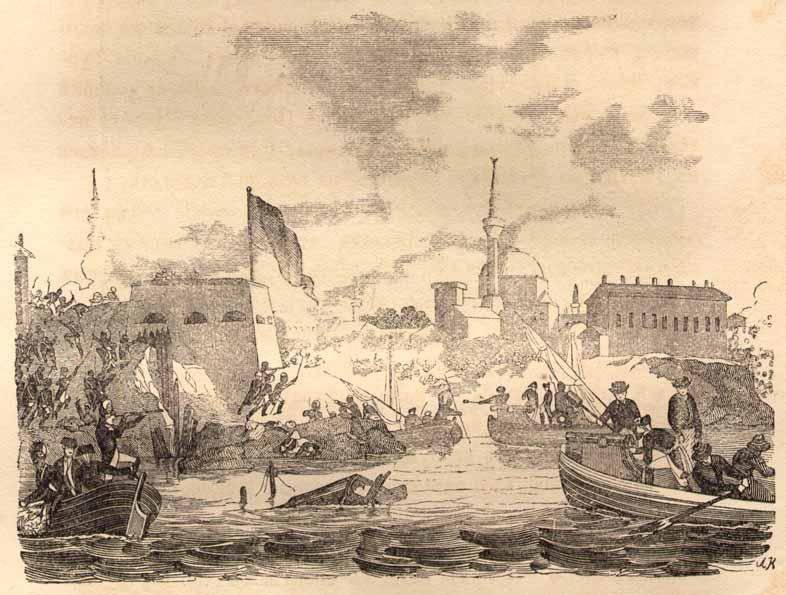
Results of the assault
The losses of the Turks were huge, more than 26 thousands of people were killed. 9 of thousands were taken prisoner, of which the next day 2 thousands died of injuries. (Orlov N. Decree. Op., P. 80.) Of the entire garrison, only one person escaped. Lightly wounded, he fell into the water and swam across the Danube on a log. In Izmail, 265 guns were taken, up to 3 thousands of pounds of gunpowder, 20 thousands of nuclei and many other combat supplies, up to 400 banners, blood-stained defenders, 8 lans, 12 ferries, 22 light vessel and plenty of rich booty, inherited troops, in total to 10 million piastres (over 1 million rubles). The Russians killed 64 officer (1 foreman, 17 headquarters officers, 46 chief officers) and 1816 privates; injured 253 officers (of which three are major generals) and 2450 lower ranks. The total loss figure was 4582 person. Some authors determine the number of thousands killed to 4, and the number of injured to 6 thousands, total 10 thousands, including 400 officers (from 650). (Orlov N. Decree. Op., P. 80-81, 149.)
According to the promise given to Suvorov in advance, the city, according to the custom of the time, was left to the authority of the soldiers. At the same time, Suvorov took measures to ensure order. Kutuzov, appointed commandant of Ishmael, in the most important places, placed guards. Inside the city was opened a huge hospital. The bodies of the murdered Russians were transported out of the city and buried according to church rites. There were so many Turkish corpses that an order was given to throw bodies into the Danube, and prisoners were identified for this work, divided into turns. But even with this method, Ishmael was cleared of corpses only after 6 days. The prisoners were sent in batches to Nikolaev under the escort of the Cossacks.
Suvorov hoped to get the rank of field marshal for the assault of Ishmael, but Potemkin, applying for his award to the empress, offered to award him with a medal and the rank of guard lieutenant colonel or adjutant general. The medal was knocked out, and Suvorov was appointed lieutenant colonel of the Preobrazhensky regiment. There were already ten such lieutenant colonels; Suvorov became the eleventh. The very same commander in chief of the Russian army, Prince GA Potemkin-Tavrichesky, arriving in St. Petersburg, received as an award field marshadskiy uniform embroidered in diamonds, priced at 200 thousand rubles. Tauride Palace; in Tsarskoye Selo it was planned to build an obelisk to the prince depicting his victories and conquests. The lower ranks were given oval silver medals; for officers a gold sign is set; chiefs received orders or golden swords, some - ranks.
The conquest of Ishmael was of great political importance. It influenced the further course of the war and the conclusion of the Yassy peace between Russia and Turkey in 1792, which confirmed the annexation of the Crimea to Russia and established the Russian-Turkish border along the r. Dniester. Thus, the entire northern Black Sea coast from the Dniester to the Kuban was assigned to Russia.
Used materials of the book: "One Hundred Great Battles", M. "Veche", 2002
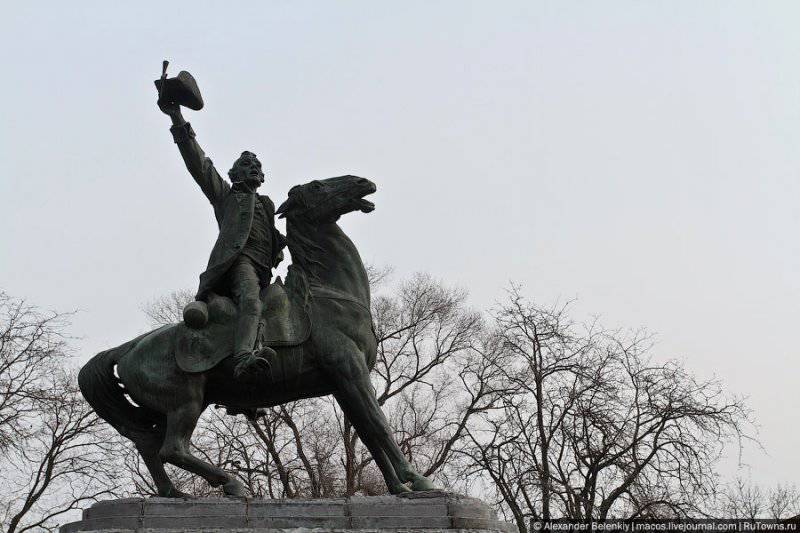
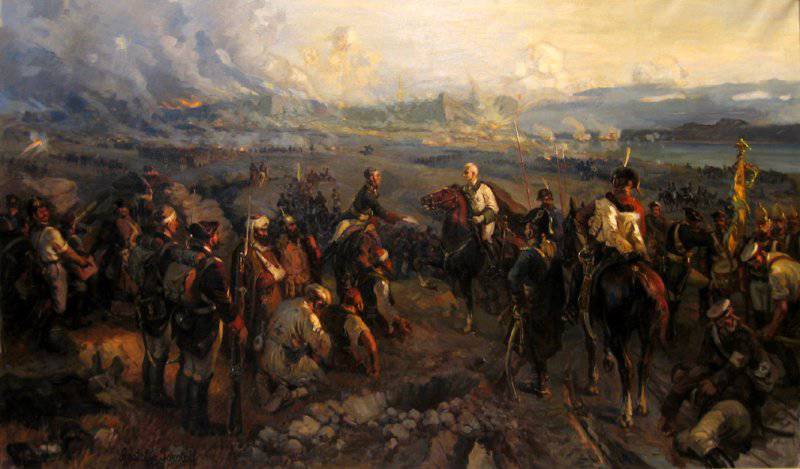
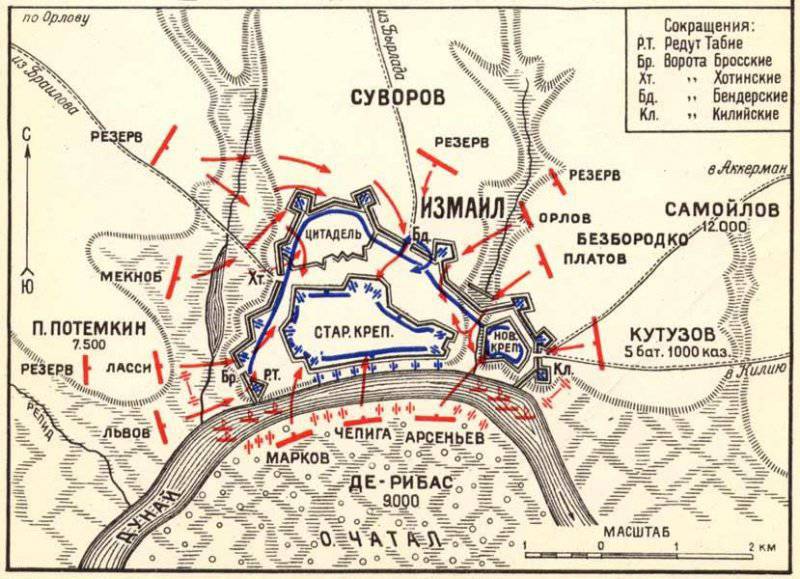
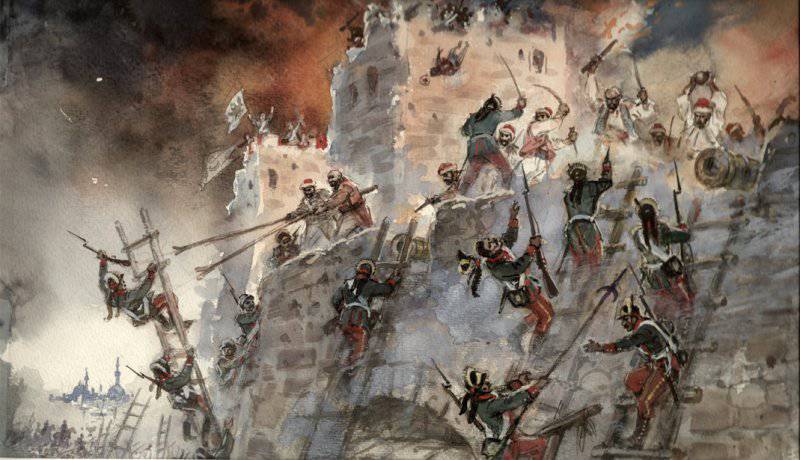
Information